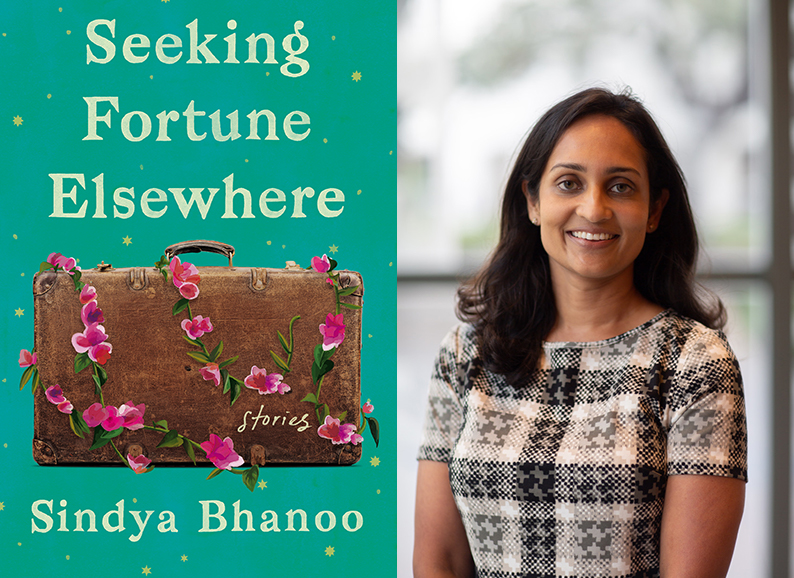SCS Alumna Parlays Programming Into Publishing
Susie CribbsThursday, March 17, 2022Print this page.

Any Carnegie Mellon University grad who reads Sindya Bhanoo's short story, "His Holiness," will know she has a CMU connection the instant they see the line, "It will take time, but my heart is in this work." What might be more surprising is that Bhanoo, who just published her first collection of short fiction, "Seeking Fortune Elsewhere," majored in computer science.
While it may seem like a big leap, the path from computer science undergraduate to published fiction author isn't as convoluted as it may seem. Bhanoo, who attended high school in Pittsburgh's eastern suburbs, knew CMU's reputation and was good at math and science.
"Everybody knew about the computer science program being the best in the country," said Bhanoo, who graduated in 2002. "So I applied and I got into the computer science program, and that was really exciting. I visited and I liked it."
Once on campus, she found herself immersed in the program's challenging curriculum. After she completed her first internship — at IBM in Austin, Texas, where she lives now — she realized she didn't want to be a programmer. Instead, she set her sights on a patent law career. After graduation, she took a job in Washington, D.C., at the U.S. Patent and Trademark Office and planned to attend law school. Patent law didn't appeal to her as much as she thought it would, but the idea of telling stories always had. She began writing essays in her free time, then moved to India to work for a nonprofit. While there, she applied to journalism schools and enrolled in the graduate program at the University of California, Berkeley.
After that, telling stories became her life and livelihood, first as an intern at the Washington Post, then at a tech magazine, The Industry Standard, in California. She moved to New York to take a reporting fellowship at the New York Times, then went back to California but kept writing for the Times, where she had a column in the Science section called "Observatory."
Bhanoo's computer science background helped with the intangibles of her reporting, like time management. But her education also gave her unique insight into the science and technology she covered.
"Computer science is a highly creative field. The work that people are doing is original research — it's original work. And there's artistry in that, both in the research and also in programming itself. That has stayed with me," Bhanoo said.
In fact, as an intern at the Baltimore Sun, Bhanoo wrote a cover story about the first major speech recognition software, Dragon Naturally Speaking, created by then-CMU professors James and Janet Baker.
"That was really fun," Bhanoo said. "I brought my CS background to that story, and I asked questions that maybe another reporter might not have been able to."
Despite a successful reporting career, Bhanoo still felt the call to tell her own stories — a call that grew after she had her first child.
"When my daughter was born, I had this sense that I had stories to tell and that if I didn't write them down, they wouldn't be there for her. It would be like they never existed."
So she started writing. As the daughter of parents who immigrated to the U.S. in the late 1970s, Bhanoo felt drawn to not just the immigrant story, but the story of the families those immigrants leave behind forever.
"Because I'm the second generation in the United States, I didn't spend a lot of time with my grandparents or aunts or uncles or cousins. But I grew up here seeing and knowing that many other kids would spend Christmas or summer vacations with family," Bhanoo said. "And you notice that there's an absence in your life. Digging into those issues — into those stories and these people's lives — was something I wanted to do."
A collection of those stories hit shelves earlier this month in Bhanoo's first book, "Seeking Fortune Elsewhere." And while it may not involve computer science specifically, SCS certainly played a role in making the book possible.
"There were moments when I was a student at Carnegie Mellon when it felt kind of impossible. The CS program is tough. You really have to do the work," Bhanoo said. "Publishing is also a bit like that, where you have to keep at it and not get discouraged and keep your focus on the work. There are a lot of rejections, and I think the people who finally make it through are the ones who persist."
She also noted that the people who succeed in both fields also have a support network for when they feel discouraged. SCS, she recalled, had Mark Stehlik, who advised her when she was a student. "He was incredibly supportive — almost a reason to stay in computer science because he was so thoughtful when he met with each student. He would address my specific needs."
And then there's CMU's famous motto, "My heart is in the work."
"The Andrew Carnegie quote that we all know as CMU graduates and students — the idea that my heart is in my work — even back then was such a powerful concept," she said. "If you can do your work and put your whole self in it, usually something good will come of it. In my experience, when I've been able to do that and not worry about prizes or awards or even grades, it's always been to my benefit."
When she was a student, Bhanoo interpreted that motto as no matter what work you're doing, put your heart into it. But that's changed as she's matured.
"As I've gotten older, it's also become that I want to find the work I can put my whole self into, put my heart into. With writing fiction, I feel like I'm getting closer to that."
Aaron Aupperlee | 412-268-9068 | aaupperlee@cmu.edu
